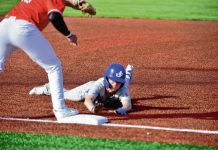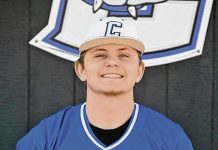
By James Essex
Butch Wilkerson’s lifelong dream to be a racecar driver was seeded when his parents took him to the Sunday afternoon races in the 1950s at the Columbus Speedway.
The track known as “The Hole” or “The Hill” was located just off State Road 7 southeast of Columbus, and was the site of Wilkerson’s first career win while driving a go-kart. That was in 1957.
Wilkerson was born in Walesboro in 1944 and graduated from Columbus High School in 1962, the same year he moved into racing stock cars. Wilkerson first drove for Columbus resident Charlie Johnson for one year before hooking up with Junior Davis in 1963. His final two years in a stock car before moving to sprints was racing for Gene Fleetwood.
In those days, Wilkerson raced primarily at Brownstown, running the stock car on the oval and then in figure-8 competition, which Brownstown would popularize in the early 60s.

“During that time, I won something like 17 out of 18 semi-features, but after March of ’64 I quit the figure-8’s because I severely broke my left leg in a motorcycle accident,” he said. “The rest of the time I just raced the quarter-mile oval they had.”
While Wilkerson was never able to win a stock-car feature in his early days of driving, it didn’t take him long to get his first sprint-car victory when he started running the open wheels during the 1965 season.
His first sprint-car ride was for Jess Kinder of Bedford. The duo raced at Bloomington, Lawrenceburg and Haubstadt. Then in 1966, he started driving for legendary car owner Dizz Wilson of Mitchell, recording his first career sprint-car win at Lawrenceburg, outrunning long-time driving star and former Knoxville Nationals winner Roy Robbins. The race paid $300 to win.
The 1973 season would prove to be one of Wilkerson’s best. He would win track championships with Wilson at Bloomington, Lawrenceburg and Haubstadt. Then two years later, Wilkerson would come back with the best overall season of his racing career.
He first teamed up with car owner Jim McQueen of Indianapolis in 1974. In 1975, the duo was nearly unbeatable in their Stapp Chassis No. 1 car. Wilkerson won a career-high in feature races and earnings. He captured 29 feature wins. He would finish first, second or third an amazing 55 out of 77 races that season. During the year, he also recorded the biggest win of his career, pocketing a $3,950 victory at the West Capital Speedway in West Sacramento, California.
Then came the final USAC race of the season at the famed Winchester Speedway in October of 1979.
Wilkerson was driving for long-time car owner Sherman Armstrong and had veteran driver Tom Bigelow as his teammate. Wilkerson had come from last place and was battling Bob East for the lead. Then Wilkerson’s life and career would change forever.
Heading into Turn 4 around the treacherous high banks of the half-mile oval, the left rear of East’s car got into the right front of Wilkerson’s mount. What Wilkerson did not know is that the contact had broken the steering arm on his car. Coming out of Turn 4, the car violently turned right, head-on into the concrete guardrail. The impact was estimated at 128 mph.
Bigelow was one of the first on the scene and helped hold up Wilkerson’s head while emergency crews worked to extricate him from his crumpled car. Wilkerson had suffered a critical head injury and was unconscious after impact. His helmet was broken, and the fuel tank of his car had flown over the guardrail.
Wilkerson was taken to Methodist Hospital in Indianapolis, where he laid in a coma for 28 days. His hospital bills totaled nearly $300,000, but thankfully for him, USAC’s participant insurance covered every penny of it.
“I still don’t remember anything about the wreck,” he said. “When I woke up from the coma, I had no idea where I was. The only thing I remember about that day was going to eat breakfast that morning. I have never seen a video or pictures of the accident. Thank goodness for USAC’s insurance. I will be eternally grateful to them for that.”
After Wilkerson left the hospital, one of the remarkable things about his near-fatal wreck was that he needed no rehab from his injuries. But returning to a normal life of racing sprint cars was put on hold, with many thinking they had seen the last of Wilkerson’s exploits on the race track.
Not only did the accident put a hold on him racing for a while, it wiped out the chance of a lifetime that local aviation pioneer Jack Rhoades of Columbus had given Wilkerson during the 1979 season. Rhoades was going to field a second car in the 1980 Indianapolis 500 for Wilkerson to drive, but after the accident at Winchester and the ensuing recovery time, Wilkerson had to forego his chance at glory.
In early 1980, less than a year after his accident, he was asked by Ted Collins and Kenny Woods to become the chief starter at Twin Cities Raceway Park in Vernon. He flagged there for one year before working the flagstand at both Bloomington and Lawrenceburg the following year. His stint lasted half of the season before deciding it wasn’t what he wanted to do.
Wilkerson didn’t race again until 1983, when Ohio car owner Mike Gross had a car available for Wilkerson to drive. After being out of the cockpit for nearly four years, Wilkerson decided to get back behind the wheel. Their agreement was to race one night a week, and the track would be Wilkerson’s favorite, Lawrenceburg.
The first night back was considered a success. Wilkerson did not win the feature, but he did finish second to the driver who dominated the 1980’s at Lawrenceburg, Greg Staab.
“It felt good to come back and race again and to finish second the first night back,” he said.
But something was missing even though he was pleased with his finish. Wilkerson said, “I didn’t have any fun.”
Wilkerson had always been a pedal-to-the-metal wide-open racer who enjoyed beating his competition week in and week out. He was good, and he knew it. But after the wreck at Winchester, the fun, the thrill of driving was not there.
Wilkerson’s last race was in 1986 at Bloomington Speedway. He was running up front with young up-and-coming drivers Mickey Smith and Rodney Ritter Jr. when they wrecked, putting Wilkerson out of the race with a damaged racecar. While walking back to the pits, he was confronted by long-time schoolmate and friend, Russ Petro, who told Wilkerson, “’That was it. You have nothing to prove to any of those people in the stands. You’ve had a great career. You don’t want to get hurt again,’ and that was the end of my driving career.”
One of Wilkerson’s favorite events to run was the Little 500, a pavement sprint-car event held each Memorial Day weekend the night before the Indy 500 at Anderson Speedway. From 1967-79, Wilkerson made 11 starts in the annual event, recording three second-place finishes. Wilkerson and car owner Karl Kinser had thought they had won the race in 1972. They crossed the finish line in first, but the track claimed a scoring error had occurred, and they were credited with second place.
Today, Wilkerson keeps his love for racing, even at age 72. He heads to Bloomington Speedway each Friday night they race to serve as the track’s chaplin. On Saturdays, if he feels like it, he will go to Lawrenceburg Speedway to watch the races.
He is a member of the Little 500 Hall of Fame. In 1980, he was awarded the Hoosier Auto Racing Fans (HARF) Pat O’Connor Memorial Award and he was selected for the HARF Hall of Fame in 2004. In 2011, he was the Hometown Hero for the annual reunion of the Columbus Speedway and 25th Street Raceway gathering.
Wilkerson is no doubt proud of his accomplishments. He has no idea how many feature wins he raced to in his career.
“We didn’t keep track of it for whatever reason,” he said. “I am proud of all our track titles we won. I just want to be remembered as a racer who always raced hard, wasn’t a dirty driver and always loved the fans.”
Columbus racers reunion today
The Columbus Racers Reunion will be held from 11 a.m. to 4 p.m. today at the Bartholomew County 4-H Fairgrounds. Admission is free.
Brownstown season opener tonight
Brownstown Speedway will try for the third time to run its season opener tonight. On the race program, will be the No-Way Out 40 for Non-Wing Sprints, paying $7,500 to win. Also racing will be Modifieds and UMRA Midgets.
James Essex writes a motorsports notebook for The Republic. Send comments to [email protected].




